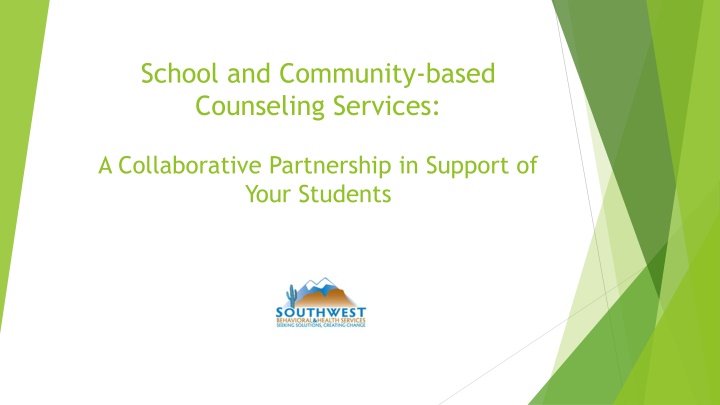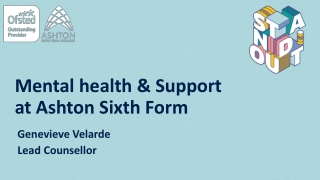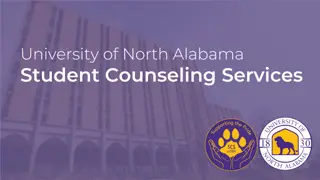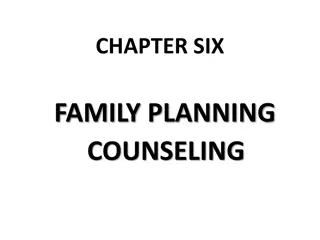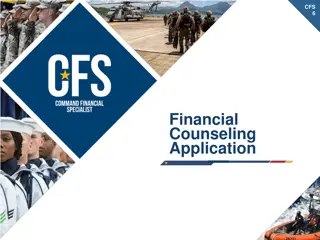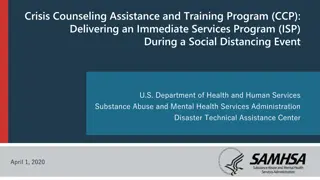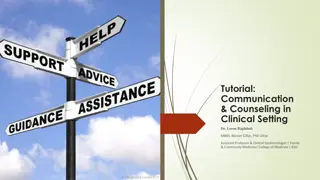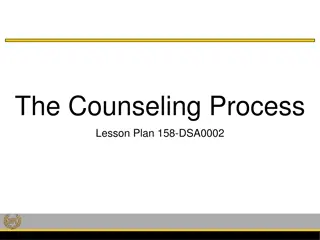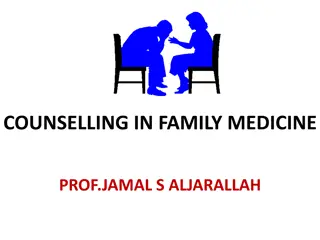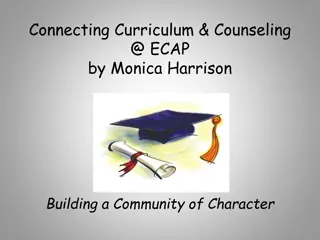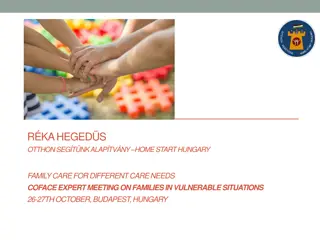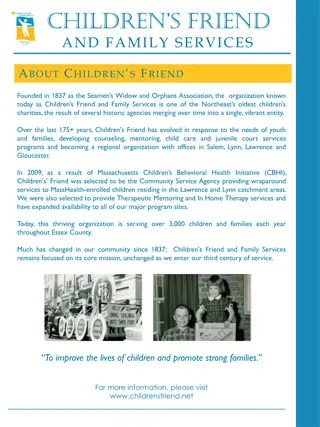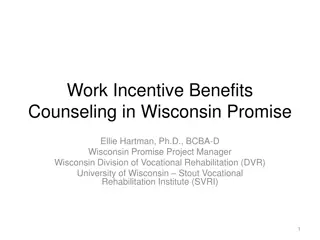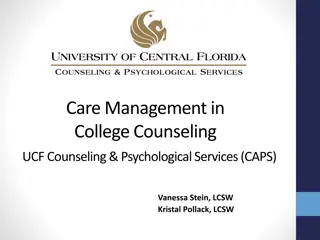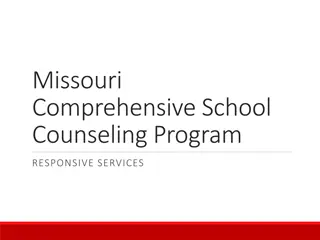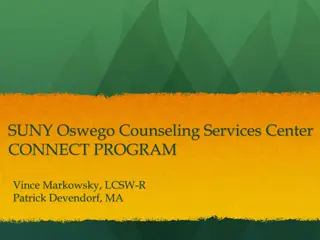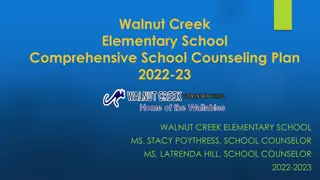School and Community-based Counseling Services: Supporting Students and Families
A collaborative partnership between school districts and Southwest Behavioral & Health Services offers counseling and support services to students and families. Eligible for services are all students and their families, with funding from various sources. Referrals can be made by school administrators, psychologists, teachers, parents, and self-referring students. Students may benefit from counseling for various issues, and the referral process involves communication with parents and submitting a referral form to the SBH school-based clinician.
Download Presentation

Please find below an Image/Link to download the presentation.
The content on the website is provided AS IS for your information and personal use only. It may not be sold, licensed, or shared on other websites without obtaining consent from the author.If you encounter any issues during the download, it is possible that the publisher has removed the file from their server.
You are allowed to download the files provided on this website for personal or commercial use, subject to the condition that they are used lawfully. All files are the property of their respective owners.
The content on the website is provided AS IS for your information and personal use only. It may not be sold, licensed, or shared on other websites without obtaining consent from the author.
E N D
Presentation Transcript
School and Community-based Counseling Services: A Collaborative Partnership in Support of Your Students
The Collaboration School districts partner with Southwest Behavioral & Health Services in order to provide an additional level of support to the students and families. Southwest Behavioral & Health Services provides a Master s or Doctoral level, clinician who is located on the identified school campus. The Southwest Behavioral & Health clinician is able to work collaboratively with the administration, teaching staff, paraprofessional staff, and families in order to provide a comprehensive level of support to students. Skill-building groups (socialization skills, emotional regulation, anger management) are available to enrolled clients. Counseling and additional services are available for students enrolled with Southwest Behavioral & Health. Enrollment is available to every student at the school.
Who is eligible for services? All students and their families are eligible for services. Funding sources include: AHCCCS KidsCare Self Pay option on a sliding scale Some private insurance plans (based on individual clinician eligibility) District partnership funding opportunities Grant and foundation funding opportunities
Who can refer for service? School administrators School psychologists Teachers Parents Self-referring students
When to Refer a Student? A student might benefit from counseling services .. What are the next steps? A school staff member or a parent/guardian identifies a child as experiencing an acute or a chronic condition or situation that could include, but is not limited to: Homelessness Grief/Loss Trauma Abuse Self-harm, DTS, DTO Depression, Anxiety, ADHD Juvenile Probation DCS involvement Family Conflict, changes, distress A school staff member identifies challenging classroom behavior from a student. The following steps have taken place: Classroom Interventions have been exhausted Communication with the student s parent is occurring and the parent is involved. The school evaluation team process is initiated. Meet with school psychologist to discuss the reason for referral and determine together if it s appropriate to submit to SBH The evaluation team has determined that these interventions have not been successful. Contact parent to discuss referral and recommendation for counseling and gain consent to submit the referral to SBH school based clinician If appropriate, contact the parent to discuss the referral and gain consent to submit the referral to SBH school based clinician If consent is given, complete the Counseling Referral Form and forward to SBH school based clinician Complete a Counseling Referral Form following consent from parent and forward to SBH school based clinician
Referral Form Identifying information Reason for referral Goals of Counseling Strengths Previous services AHCCCS information Parent Consent Follow Up
What Behavioral Health Services are Provided and Available? Individualized assessment Individualized Services Plan (ISP) for each child receiving services Individual and family counseling Skill-building groups (socialization skills, anger management, emotional regulation) Behavior coaching/modification Psychiatric services Coordination of care, community outreach, and resource development Child and Family Team meetings
Child & Family Team Process (CFT) All of these services are coordinated through the Child and Family Team (CFT) process, which is an aspect of the Arizona Model for Children and Families. This process identifies the key stakeholders in the life of the child and unites these stakeholders in the child s needs and goals with the long-term objective of sustaining the successes the child attains through participating in behavioral health services. The Child & Family Team can be comprised of: the child, parent/guardian, key school staff, DCS, Juvenile Probation, family friends and relatives, other support providers (case managers, behavior coaches), mentor, medical provider. SBH Child & Family Team Community School Other natural supports
Counseling Services: Flow of Services Initial outreach call from SBH staff: What can a parent and student expect from counseling services with Southwest Behavioral & Health Services within Deer Valley Unified School Distrcit? Description of the program Discuss presenting concerns and goal setting Schedule the initial intake assessment Services Begin Individual counseling, in-class support, crisis management, emotional regulation, de- escalation Family meetings to support strategies learned at school Progress reviewed at each session Regular contact and communication with teachers and school staff CFT meetings at least every 90 days Ongoing collaboration with SBH counselor, school staff, other family members and community members. Already Enrolled with a Behavioral Health Provider? SB&H can collaborate with existing behavioral health providers SB&H can support skills and strategies your child is learning throughout the school day by collaborating with the existing counseling team
How do School-based Clinicians Work with your School? How can schools support their school-based clinician? Access to consistent, confidential space Access to school email Access to school staff, teachers, administrators and student schedules Invitations to IEP/504 Plan meeting and parent/teacher meeting for enrolled clients
Contact Information East Valley School Based Programming Carrie Holmes Program Director 602-696-4287 Email: CarrieH@sbhservices.org Central Valley School Based Programming Alysson Zatarga Program Director 602-686-1016 Email: AlyssonZ@sbhservices.org West Valley School Based Programming Kathy Villa Program Director 602-525-3329 Email: KathyV@sbhservices.org
